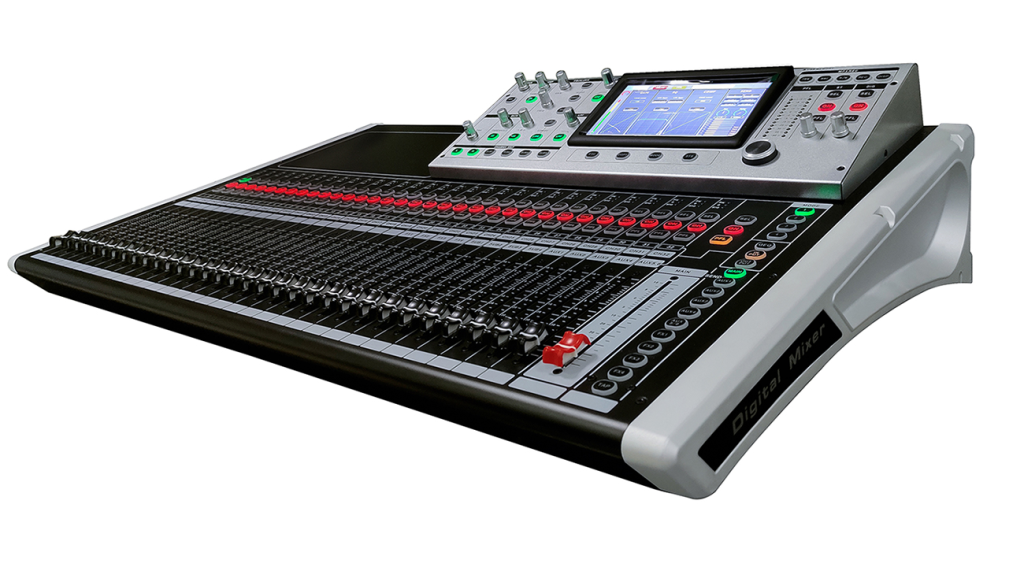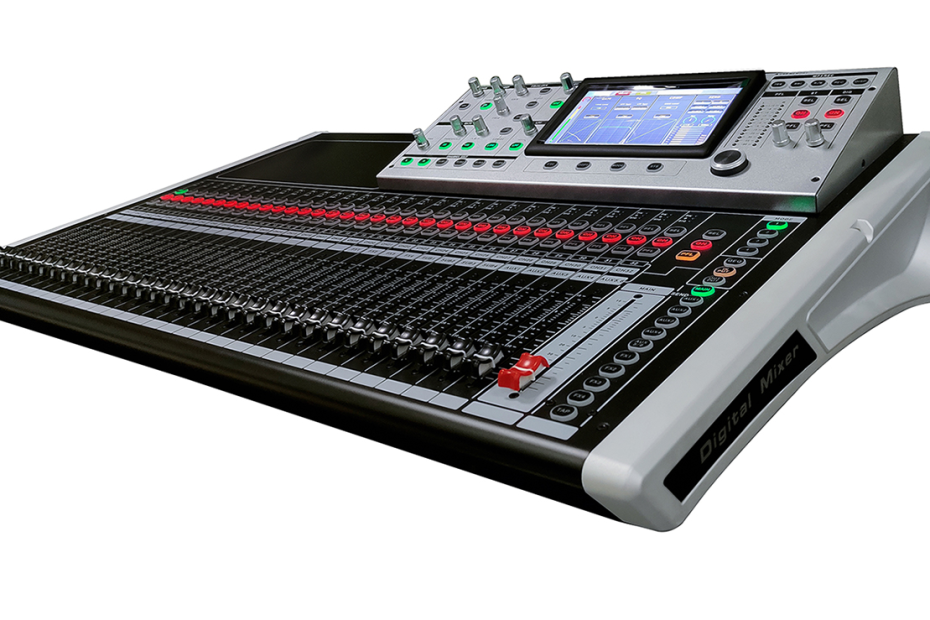Digital Mixers as the Core of Music Production
In the ever-evolving landscape of music production, digital mixers have become an indispensable tool for sound engineers, musicians, and producers. Whether in a professional recording studio or a live performance setting, digital mixers serve as the central hub for managing and refining audio signals. Their advanced technology, user-friendly interfaces, and versatility make them the backbone of modern music production. In this blog, we’ll explore why digital mixers are considered the core of music production and how they revolutionize the way we create and manage sound.

Understanding Digital Mixers and Their Role in Music Production
What Are Digital Mixers?
Digital mixers are advanced audio devices designed to manage, process, and route multiple audio signals simultaneously. Unlike analog mixers, digital mixers use digital signal processing (DSP) to offer a wide range of features, including built-in effects, equalization, and automation. These mixers are widely used in studio recording, live sound, and broadcasting due to their efficiency and precision.
How Digital Mixers Differ from Analog Mixers
While analog mixers rely on physical knobs and faders to control audio, digital mixers provide a more streamlined and versatile approach. They allow for precise adjustments, save and recall settings, and often come with software integrations for remote control and advanced functionality. The ability to handle complex audio setups with ease is one of the key reasons digital mixers have become the core of music production.
Benefits of Using Digital Mixers in Music Production
Enhanced Sound Quality
One of the most significant advantages of digital mixers is their ability to deliver high-quality sound. They process audio signals with incredible accuracy, ensuring minimal distortion and noise. Additionally, many digital mixers come equipped with high-resolution preamps and converters, further enhancing audio clarity.
Built-In Effects and Processing
Digital mixers often include a wide array of built-in effects, such as reverb, delay, compression, and EQ. These tools eliminate the need for external processors, saving both space and money. With these effects available at your fingertips, you can shape and refine your sound with precision.
Automation and Presets
Automation is a game-changing feature in digital mixers. Users can save custom settings and recall them instantly, which is particularly useful in live performances or multi-track recording sessions. This level of control allows for consistency and efficiency in music production workflows.
Scalability and Flexibility
Digital mixers can handle a wide range of inputs and outputs, making them suitable for projects of all sizes. Whether you’re mixing a small band or a full orchestra, these mixers provide the flexibility to adapt to your specific needs. Many models also support expansion through additional input/output cards or networked audio systems.
Compact and Portable Design
Modern digital mixers are designed to be lightweight and compact, making them easy to transport and set up. This portability is particularly valuable for live sound engineers who frequently move between venues. Despite their smaller size, digital mixers do not compromise on functionality or performance.
How Digital Mixers Enhance Workflow in Music Production
Streamlined Signal Routing
With digital mixers, signal routing becomes incredibly straightforward. These mixers allow for quick and easy assignment of inputs and outputs, enabling users to focus on the creative aspects of music production. This streamlined workflow is one of the reasons digital mixers are at the heart of music production.
Remote Control Capabilities
Many digital mixers come with remote control functionality, allowing users to adjust settings via smartphones, tablets, or computers. This feature is particularly beneficial during live performances, as it enables sound engineers to make real-time adjustments from anywhere in the venue.
Multi-Track Recording
Digital mixers often include multi-track recording capabilities, making them ideal for studio use. This feature allows users to record individual tracks separately, providing greater flexibility during the editing and mixing stages.
Applications of Digital Mixers in Different Settings
Studio Recording
In a recording studio, digital mixers serve as the central hub for capturing, processing, and monitoring audio signals. Their ability to handle multiple tracks and integrate with digital audio workstations (DAWs) makes them indispensable for producers and sound engineers.
Live Sound
Digital mixers are widely used in live sound applications, from concerts to theater productions. Their ability to manage complex setups, recall presets, and adjust audio in real-time ensures a seamless performance experience.
Broadcasting and Streaming
For broadcasting and streaming, digital mixers provide precise control over audio levels and routing. They enable broadcasters to manage multiple audio sources efficiently, ensuring clear and balanced sound for their audiences.
Choosing the Right Digital Mixer for Your Needs
Assessing Your Requirements
When selecting a digital mixer, it’s essential to consider your specific needs. Factors such as the number of input channels, built-in features, and compatibility with other equipment should guide your decision.
Budget Considerations
Digital mixers come in a wide range of price points. While high-end models offer advanced features and superior sound quality, budget-friendly options can still deliver excellent performance for smaller projects or personal use.
Top Brands and Models
Brands like Yamaha, Behringer, Allen & Heath, and PreSonus are renowned for producing high-quality digital mixers. Researching and comparing models from these brands can help you find a mixer that suits your needs.
Future Trends in Digital Mixers
Integration with AI and Machine Learning
The future of digital mixers lies in AI-driven features that simplify mixing and improve audio quality. From automated EQ adjustments to real-time feedback suppression, these advancements are set to make digital mixers even more powerful.
Enhanced Networking Capabilities
With the rise of audio-over-IP technologies, digital mixers are becoming increasingly network-friendly. This trend allows for greater flexibility in signal routing and easier integration with other devices.
Increased Accessibility
As technology continues to advance, digital mixers are becoming more accessible to hobbyists and small studios. Affordable models with professional-grade features are opening new possibilities for aspiring musicians and producers.
Digital mixers have become the cornerstone of modern music production, offering unparalleled sound quality, flexibility, and efficiency. From studio recording to live sound and broadcasting, these mixers provide the tools needed to manage and refine audio signals effectively. By investing in a digital mixer, you can streamline your workflow, enhance your creative potential, and stay ahead in the ever-evolving world of audio production. Whether you’re a seasoned professional or just starting, digital mixers are an essential component of any music production setup.
